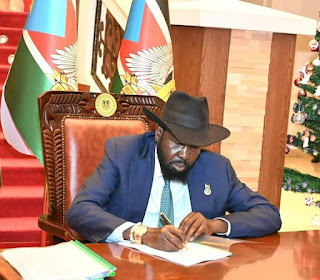 |
| President Salva Kiir Mayardiit. |
Top trending news:
President Salva Kiir Mayardit held talks with Vice Chancellors of the country's leading public universities to discuss the pressing challenges facing higher learning institutions, particularly in the areas of financing and human resource allocation.
The meeting held at the State House provided a platform for university leaders to present their concerns and seek solutions to the mounting difficulties that public institutions are currently grappling with.
During the meeting, President Kiir expressed a strong commitment to addressing the financial shortfalls and other challenges that hinder the growth and development of public universities.
The Head of State also assured the Vice Chancellors that his administration recognizes the importance of these institutions in shaping the future of the nation and is working on a comprehensive strategy to support them in the face of economic pressures.
The Vice Chancellor of the University of Juba, Professor Robert Mayom lauded the President for his willingness to address the challenges facing higher learning institutions in the country, noting that this approach would pave the way for much-needed reforms in the country's education sector.
Notably, the Government’s dedication to bolstering educational support for all the public universities remains steadfast, ensuring sustainable support for the nation’s educational endeavours.
This meeting marks a significant step toward improving the state of public university education in South Sudan. By engaging directly with Vice Chancellors, President Kiir shows his administration's commitment to tackling key challenges, especially financial and staffing issues, which have long affected the quality of higher education in the country.
President Kiir’s focus on a comprehensive strategy underscores an awareness of the universities' role in national development. With leaders like Professor Robert Mayom expressing optimism, there is a promising outlook for reforms that could strengthen educational infrastructure and enhance the overall learning environment for students.
Number of Universities and Colleges:
South Sudan has about 12 officially recognized universities, both public and private.
The main public universities include the University of Juba, John Garang Memorial University of Science and Technology, and the University of Bahr El Ghazal.
Additionally, there are numerous smaller private colleges and specialized institutions, like the Catholic University of South Sudan and other private colleges across various cities, particularly Juba and Bentiu.






Comments
Post a Comment